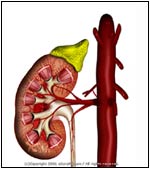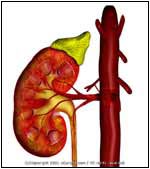|
|
 |

Normal |

Abnormal |
| |
- Pyelonephritis describes a syndrome caused by the inflammation (irritation, swelling, pain, damage) of the tubes (renal tubules) that carry urine from the kidneys to the bladder (upper urinary tract) and the renal (kidney) interstitium (tissue surrounding the renal structures).
- Pyelonephritis can be acute (sudden) or chronic (prolonged) in nature.
|
 |
- Fever
- Chills
- Flank pain -- pain in the middle or sides of the back.
- Abdominal pain -- over the bladder (suprapubic) located in the middle-lower part of the abdomen
- Vomiting
- Headache
- Foul odor
- Cloudy urine
- There may be symptoms of lower Urinary Tract Infections
- Dysuria -- painful urination
- Burning upon urination
- Hematuria -- Blood in the Urine
- Frequent urination
- Diarrhea
- Difficulty with urination -- such as initiating the urinary stream, bed wetting, frequent nighttime urination (nocturia) may also be present depending on the cause and risk factors.
- Elderly patients may experience confusion and mental status changes.
|
 |
- Mostly secondary to Cystitis (Bladder Infection)
- Escherichia coli is responsible for 75 % of all infections.
- Proteus, Klebsiella, Enterobacter, Pseudomonas, Enterococcus, Candida, Gonorrhea, Staphylococcus, Mycoplasma, and Salmonella are some other infectious agents that may result in Pyelonephritis.
- Reflux nephropathy -- the backflow (vesicoureteric Reflux) of urine from the bladder to the ureter (tube going from the kidney to the bladder) and the kidneys, especially if the urine is infected, can result in acute or chronic (over time) Pyelonephritis.
|
 |
-
History of symptoms, allergies, medications, illnesses, surgeries, habits and risk factors.
- Medical exam may reveal:
- Fever
- Flank or abdominal pain
- Sweaty skin
- Urine analysis -- microscopic analysis of a plain urine sample and a dyed (Gram stain) sample may show blood cells (white and red blood cells) and the bacteria that cause the infection.
- Presence of white blood cells in the urine (Pyuria) may indicate an infection or inflammation.
- Red blood cells indicate leakage of the blood into the urine
- Urine cultures -- a
sterile or clean-catch urine sample is collected (if necessary, a catheter can be used to obtain samples from the bladder) and sent to a laboratory to be cultured or grow so that the infectious agent (bacteria, fungus etc.) can be properly identified and the appropriate treatment (i.e., antibiotic type) can be recommended. This will take 1-3 days or longer.
- Blood cultures can be done if there is a suspicion that the infection has spread to the blood.
- Blood tests may be done to assess the functioning capacity of the kidney.
- If needed, special techniques such as a Cystoscopy or an Ultrasonography (using sound), CAT scan (using computer imaging) and IVP (using a dye that is injected into the blood) can provide detailed pictures of the kidneys, bladder, uterus prostate, and the urethra.
|
 |
- Women>men
- Enlarged Prostate
- Abnormal urinary system structures present from birth (congenital)
- Recurrent and chronic Urinary Tract Infections
- Local trauma -- from insertion of devices into the urethra (tube carrying urine from the bladder to the outside) or bladder, such as a Foley catheter (plastic tube to help empty the bladder) or Cystoscopy (camera to look inside the bladder).
- Sexual intercourse
- Bladder or Kidney Stones
- Surgery of the renal system
- Weakened immune system (immunocompromised) or body's natural defenses such as in cancer or AIDS or on chemotherapy (cancer treating drugs)
- Diabetes Mellitus
- Elderly
- Prolonged bed rest such as in nursing homes
- Pregnancy
|
 |
- Outpatient for mild to moderate infections with low-grade fevers, mild pain, and if the patient is not pregnant.
- Inpatient for very sick individuals
- General or broad spectrum (covering most bacteria types) Antibiotics are given until culture results become available, and are then tailored to the specific agent.
- Plenty of fluids, rest and pain medications.
- Tylenol is prescribed for fever in those receiving outpatient therapy
- Inpatient therapy will include intravenous or IV (inside the veins) antibiotics and fluids.
- Surgery is needed if the stones, tumors, congenital anomalies or prostate problems are the cause.
- Follow up after therapy is usually done within the first two weeks to see if the infection is resolved
|
 |
- If there are symptoms, similar to those mentioned above, contact your doctor immediately.
- Men and children with Pyelonephritis or more than one Urinary Tract Infections need to have a more detailed
evaluation of their urinary and kidney system.
|
| | |
If you want your friend to read or know about this article, Click here
 |
|
|

